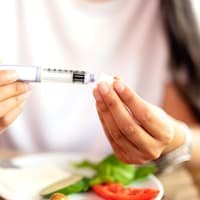
Recognizing diabetes: The different types
Diabetes mellitus, also known as diabetes, refers to two diseases. Both have in common that the metabolism of the affected person is disturbed. Type 2 diabetes is the most common form of diabetes. The cells gradually become insensitive to the hormone insulin. Insulin is used to absorb glucose (dextrose) from the bloodstream into the cells in order to produce energy. The result: the blood sugar level rises. Older people are usually affected; a hereditary predisposition, obesity or lack of exercise often also play a role. Type 1 diabetes, on the other hand, is an autoimmune disease in which the body's immune system destroys the islet cells in the pancreas that produce insulin. The signs of type 1 diabetes appear at a young age and sufferers have to inject insulin for the rest of their lives.
Signs of diabetes: Urinary urgency, thirst, weight loss
The first signs of diabetes can look like this:
- Breath smelling of acetone: In type 1 diabetics, diabetes can be recognized by their breath: It smells like acetone - the odor is similar to that of overripe fruit. This is due to the breakdown of fat in the cells as a result of the lack of sugar. Caution: The smell indicates a high insulin deficiency, which can lead to a diabetic coma
- Strong urge to urinate: The affected body tries to get rid of the increased sugar content in the blood via the urine. The result: frequent trips to the toilet - an early sign of diabetes
- Severe thirst: The latter symptom in turn leads to an increased need to drink fluids
- Another sign of diabetes: sweating while eating, on the face and neck
- Itchy, dry skin: This is caused by the excretion of sugar via the urine - and the resulting loss of fluids
- Weight loss: This is also a result of water loss due to increased urine excretion. In type 1 diabetes patients, the cells break down fat to meet their energy needs due to poorer blood sugar utilization - which also leads to weight loss
- Tiredness: those affected feel excessively weak and tired
- Poorer wound healing: diabetes can have a negative impact on the immune system. Combined with poorer blood circulation to the skin, wounds do not heal as quickly as normal
- Periodontitis: Diabetes patients are more prone to bacterial inflammation of the gums
- Increased susceptibility to infections: people with diabetes are more susceptible to athlete's foot, urinary tract and skin infections
Sometimes type 2 diabetes shows hardly any symptoms at first. It is therefore always advisable to check for signs of diabetes and their typical values during an upcoming blood test.






